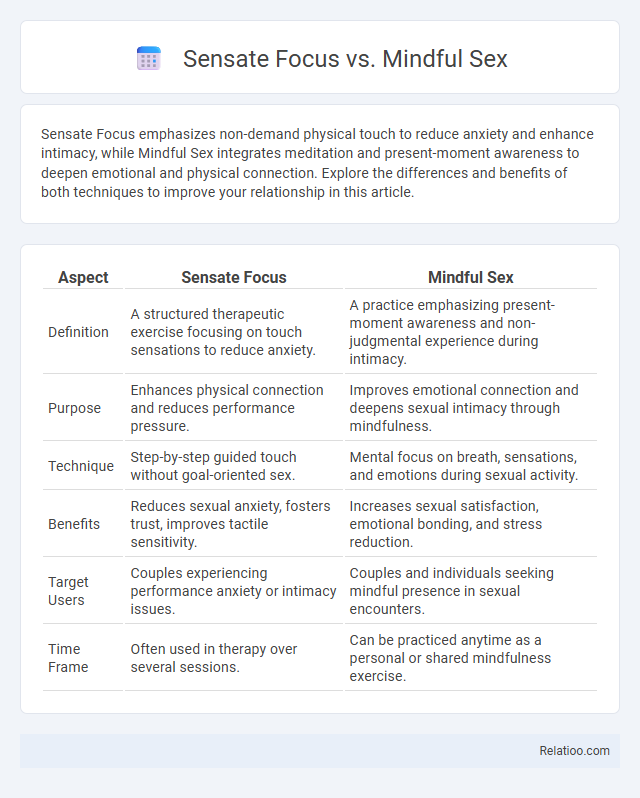Sensate Focus emphasizes non-demand physical touch to reduce anxiety and enhance intimacy, while Mindful Sex integrates meditation and present-moment awareness to deepen emotional and physical connection. Explore the differences and benefits of both techniques to improve your relationship in this article.
Table of Comparison
| Aspect | Sensate Focus | Mindful Sex |
|---|---|---|
| Definition | A structured therapeutic exercise focusing on touch sensations to reduce anxiety. | A practice emphasizing present-moment awareness and non-judgmental experience during intimacy. |
| Purpose | Enhances physical connection and reduces performance pressure. | Improves emotional connection and deepens sexual intimacy through mindfulness. |
| Technique | Step-by-step guided touch without goal-oriented sex. | Mental focus on breath, sensations, and emotions during sexual activity. |
| Benefits | Reduces sexual anxiety, fosters trust, improves tactile sensitivity. | Increases sexual satisfaction, emotional bonding, and stress reduction. |
| Target Users | Couples experiencing performance anxiety or intimacy issues. | Couples and individuals seeking mindful presence in sexual encounters. |
| Time Frame | Often used in therapy over several sessions. | Can be practiced anytime as a personal or shared mindfulness exercise. |
Introduction to Sensate Focus and Mindful Sex
Sensate Focus is a therapeutic technique developed to enhance physical intimacy by focusing on non-demanding touch and heightened sensory awareness, reducing performance anxiety and promoting emotional connection. Mindful Sex incorporates meditation principles to cultivate present-moment awareness during sexual activity, fostering deeper intimacy and acceptance of sensations without judgment. Both approaches prioritize conscious sensory engagement to improve sexual satisfaction and emotional bonding.
Defining Sensate Focus: Origins and Principles
Sensate Focus, developed by Masters and Johnson in the 1960s, is a therapeutic technique designed to reduce performance anxiety and enhance physical intimacy through structured, non-demanding touch exercises. Its core principle is to shift attention away from sexual performance and towards mindful awareness of bodily sensations, fostering deeper connection and relaxation. Your experience improves as Sensate Focus encourages presence, sensitivity, and gradual exploration within a safe, judgment-free space.
Understanding Mindful Sex: Concepts and Foundations
Mindful sex centers on present-moment awareness and non-judgmental acceptance during intimate encounters, fostering deeper emotional and physical connection between partners. Unlike Sensate Focus, which involves structured touch exercises to reduce anxiety and enhance sensation, mindful sex emphasizes conscious attention to bodily sensations, thoughts, and emotions without a predefined technique. Sexual healing integrates therapeutic practices addressing emotional trauma and relational issues, whereas mindful sex primarily cultivates awareness and acceptance to improve sexual well-being.
Key Differences Between Sensate Focus and Mindful Sex
Sensate Focus emphasizes structured tactile exercises designed to reduce performance pressure and enhance physical sensation awareness during intimacy, while Mindful Sex centers on present-moment awareness and non-judgmental acceptance of emotional and bodily experiences throughout sexual activity. Sensate Focus often follows a therapist-guided progression to build intimacy and comfort, whereas Mindful Sex encourages ongoing mindfulness practices to deepen connection and reduce anxiety spontaneously. Your choice between these approaches depends on whether you seek a goal-oriented technique to address sexual dysfunction (Sensate Focus) or a holistic practice fostering emotional presence and self-compassion (Mindful Sex).
Techniques in Sensate Focus Therapy
Sensate Focus Therapy techniques involve structured, non-demand sensual touching exercises designed to reduce performance anxiety and enhance physical awareness and connection between partners. Techniques progress through phases, starting with non-genital touch, emphasizing mindfulness of sensory experiences, then gradually including genital contact to rebuild intimacy and pleasure without pressure for orgasm. These methods contrast with mindful sex, which focuses on present-moment awareness during sexual activity, and sexual healing, which often incorporates broader psychological and emotional therapeutic interventions.
Mindful Sex Practices for Enhanced Intimacy
Mindful sex practices enhance intimacy by fostering present-moment awareness, reducing anxiety, and deepening emotional connection between partners. Unlike Sensate Focus, which emphasizes structured touch exercises, and Sexual Healing, which targets trauma recovery, mindfulness in sex encourages attunement to sensations and genuine communication during intimacy. Incorporating mindfulness techniques such as focused breathing and nonjudgmental awareness promotes greater pleasure and relational satisfaction.
Psychological and Emotional Benefits Compared
Sensate Focus emphasizes gradual touch and awareness to reduce anxiety, enhancing emotional intimacy and trust between partners. Mindful Sex cultivates present-moment awareness and acceptance, promoting deeper connection and reducing stress by acknowledging sensations without judgment. Sexual Healing focuses on overcoming trauma and emotional barriers, helping you restore confidence, improve self-esteem, and foster healthier sexual relationships.
Integrating Sensate Focus and Mindfulness in Relationships
Integrating Sensate Focus and Mindfulness in relationships enhances emotional connection by promoting present-moment awareness and non-judgmental touch, which reduces performance anxiety and deepens intimacy. Sensate Focus exercises guide partners to explore physical sensations without distraction, while Mindfulness cultivates attention to internal experiences, strengthening communication and empathy. You can foster a more fulfilling sexual relationship by blending these techniques, leading to improved emotional bonding and sexual satisfaction.
Addressing Common Misconceptions
Sensate Focus emphasizes non-goal-oriented touch to reduce performance anxiety, while Mindful Sex cultivates present-moment awareness to deepen intimacy and pleasure. Sexual healing often involves therapeutic interventions addressing trauma or emotional barriers impacting sexual health. Your understanding improves when you recognize that these approaches are complementary, not mutually exclusive, each tailored to different aspects of sexual well-being.
Choosing the Right Approach for Your Sexual Wellness
Sensate Focus emphasizes gradual, non-demand sexual touch to reduce anxiety and build intimacy, while Mindful Sex incorporates present-moment awareness and deep breathing to enhance connection and pleasure. Sexual Healing often involves therapeutic techniques addressing trauma, emotional wounds, and psychological barriers impacting sexual function. You can choose the right approach based on your needs: Sensate Focus for anxiety relief, Mindful Sex for enhancing mindfulness and connection, or Sexual Healing for deeper emotional recovery and trauma resolution.

Infographic: Sensate Focus vs Mindful Sex
 relatioo.com
relatioo.com